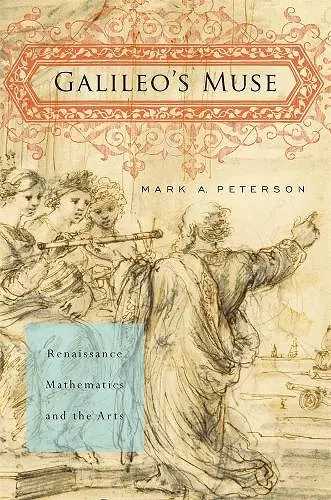Galileo's Muse
Renaissance Mathematics and the Arts
Format:Hardback
Publisher:Harvard University Press
Published:16th Nov '11
Currently unavailable, and unfortunately no date known when it will be back

Peterson's book portrays Galileo in a wonderfully fresh perspective. Over several decades I have steeped myself in Galileo biographies, and it's really rare to find an account as intriguing as this one. -- Owen Gingerich Galileo's Muse explores a wealth of intriguing connections between the arts and the birth of modern science, presented with thought and verve. Mark Peterson's excitement shines through on every page -- Peter Pesic, author of Sky in a Bottle and Labyrinth: A Search for the Hidden Meaning of Science Galileo's Muse is a brilliant study that lucidly explains the mathematics central to innovations in the Renaissance arts and sciences. Peterson's expertise as a mathematician and physicist gives this book a level of detail and insight that will offer much to historians of art, science, literature alike. -- Arielle Saiber, Associate Professor of Italian, Bowdoin College
Mark Peterson makes an extraordinary claim in this fascinating book focused around the life and thought of Galileo: it was the mathematics of Renaissance arts, not Renaissance sciences, that became modern science. Painters, poets, musicians, and architects brought about a scientific revolution that eluded the philosopher-scientists of the day.
Mark Peterson makes an extraordinary claim in this fascinating book focused around the life and thought of Galileo: it was the mathematics of Renaissance arts, not Renaissance sciences, that became modern science. Galileo's Muse argues that painters, poets, musicians, and architects brought about a scientific revolution that eluded the philosopher-scientists of the day, steeped as they were in a medieval cosmos and its underlying philosophy.
According to Peterson, the recovery of classical science owes much to the Renaissance artists who first turned to Greek sources for inspiration and instruction. Chapters devoted to their insights into mathematics, ranging from perspective in painting to tuning in music, are interspersed with chapters about Galileo's own life and work. Himself an artist turned scientist and an avid student of Hellenistic culture, Galileo pulled together the many threads of his artistic and classical education in designing unprecedented experiments to unlock the secrets of nature.
In the last chapter, Peterson draws our attention to the Oratio de Mathematicae laudibus of 1627, delivered by one of Galileo's students. This document, Peterson argues, was penned in part by Galileo himself, as an expression of his understanding of the universality of mathematics in art and nature. It is "entirely Galilean in so many details that even if it is derivative, it must represent his thought," Peterson writes. An intellectual adventure, Galileo’s Muse offers surprising ideas that will capture the imagination of anyone—scientist, mathematician, history buff, lover of literature, or artist—who cares about the humanistic roots of modern science.
Peterson's book portrays Galileo in a wonderfully fresh perspective. Over several decades I have steeped myself in Galileo biographies, and it's really rare to find an account as intriguing as this one. -- Owen Gingerich
Galileo's Muse explores a wealth of intriguing connections between the arts and the birth of modern science, presented with thought and verve. Mark Peterson's excitement shines through on every page -- Peter Pesic, author of Sky in a Bottle and Labyrinth: A Search for the Hidden Meaning of Science
Galileo's Muse is a brilliant study that lucidly explains the mathematics central to innovations in the Renaissance arts and sciences. Peterson's expertise as a mathematician and physicist gives this book a level of detail and insight that will offer much to historians of art, science, literature alike. -- Arielle Saiber, Associate Professor of Italian, Bowdoin College
Peterson advances the hypothesis that it was the interplay of mathematics in the arts, not the philosophically-bent sciences of the day that evolved into our modern sciences. * Publishers Weekly *
Peterson believes there is a fresh and important story to tell about Galileo's roots in Renaissance humanism. He tells that story well and makes the fascinating argument that Galileo's interest in applied geometry arose not from the study of orthodox philosophy and mathematics but from his interest in the application of geometry to poetry, painting, music and architecture. He makes this case well. -- Paul Monk * The Australian *
Mark A. Peterson takes us on a lively journey...Galileo's Muse is a welcome addition to the growing literature on art and science in the early modern period. -- Alexander Marr * Times Literary Supplement *
- Nominated for PROSE Awards 2011
ISBN: 9780674059726
Dimensions: unknown
Weight: unknown
352 pages